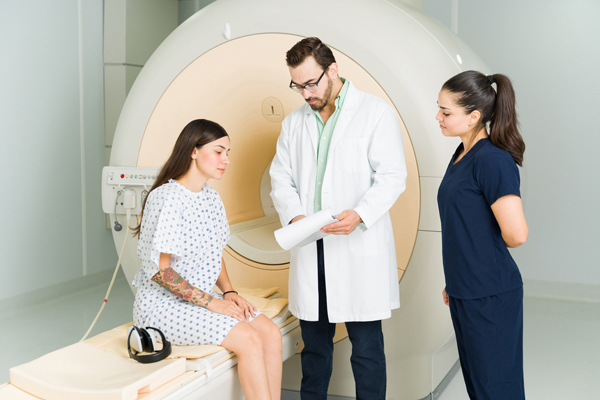
There are nearly 1 million adults living in the U.S. with multiple sclerosis. Yet, it remains a misunderstood and often misdiagnosed condition.1 Recently Emmy winner Christina Applegate was diagnosed with multiple sclerosis. She publicly shared her early symptoms of experiencing numbness and tingling in her extremities, feeling off-balanced and in pain. Multiple Sclerosis is an unpredictable, often disabling disease, making early detection vital.
Early diagnosis of M.S. can lead to better treatment options and the creation of personalized plans for patients to achieve the best outcomes. The use of MRI (magnetic resonance imaging) in the diagnosis of multiple sclerosis has become revolutionized by the most sensitive ability of an MRI to detect changes in the brain and spinal cord in 90% of people suspected of having the disease.2 A MRI makes it possible for healthcare providers to visualize and understand details about the disease's underlying pathology.
With MS, your immune system attacks the myelin coating surrounding nerves. MRI scans can pick up these areas of damage, called lesions, in different parts of your central nervous system. MRI uses magnetic fields and radio waves to measure the relative water content in normal and abnormal tissues in the body. The fat is stripped away in areas where MS has damaged the myelin. With the fat gone, the site holds more water and shows up on an MRI scan as either a bright white spot or a darkened area depending on the type of scan used.
What we can see on an MRI scan can explain the symptoms you might be experiencing. But it doesn't always, which is why working with a neurologist is crucial. Your neurologist will ask you many questions about your health problems and symptoms, now and in the past. A neurologist can order your MRI and give a physical examination to check for changes or weaknesses in your eye movements, coordination, balance, speech, reflexes, and sensation.
An imaging test is crucial for confirming neurological disorders. If multiple sclerosis is suspected, a radiologist or technologist can assist your physician with an imaging scan to gather information for a diagnosis.
Houston MRI offers affordable imaging services for neurological conditions throughout the Houston metro area. Contact us at (713)425-8190 to schedule an appointment.
Our mission at Houston MRI ® & Diagnostic Imaging is to provide patients and physicians with affordable medical diagnostic imaging in a warm and patient-friendly environment. Our promise to our communities is "hospital quality imaging without the hospital costs" with efficient service to both our patients and physicians.



